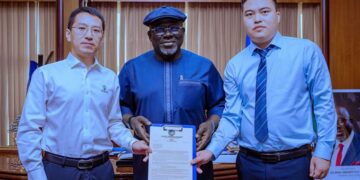The Polymer Institute of Nigeria (PIN) improved power supply is key to reviving the decline in production and polymer products in Nigeria.
National President, Polymer Institute of Nigeria, Professor Emmanuel Osabohien, stated this during the award night to climax the institute’s 32nd Annual Technical/4th International Conference, which held at the Wellington Hotel in Effurun near Warri, Delta State.
The Petroleum Training Institute, Effurun, Delta State was venue for the conference tagged “Warri 2022” and was held From Wednesday 9th to Friday 11th November, 2022, with the theme: “Natural and Nanopolymers for Sustainable Development”.

In his address at the award night, Professor Osabohien said Polymer Institute of Nigeria is one of the professional bodies, non-profit making organisation in Nigeria aimed at promoting, developing and advancing knowledge in the fields of Polymer Science, Technology and Engineering in the nation’s educational institutions and the polymer and allied industries in Nigeria and the world.
He disclosed that the institute has partnered very closely with the management of TETFUND, Nigeria, Abuja, ANA industries Limited and other organisations and companies but solicited for the partnership of the institute with more NGOs and Government agencies to enhance the institute’s visibility.
Professor Osabohien congratulated the winners of 2022 Raw Materials Research and Development Council Institutional Award Competition for researchers in Nigeria’s higher institutions and research institutes.

Speaking in an interview, National President, Polymer Institute of Nigeria spoke of effort to Charter the institute so that it will be involved deeply in the control, production and use of Polymers in the country.
“We have pursued the Chartering of PIN so that the institute will be involved deeply in the control, production and use of Polymers such as plastics, rubbers, textiles and so on. As soon as the institute becomes Chartered it becomes a full government organ to control the production and use of Polymers.
“This, we hope shall be achieved in the nearest future. We have pursued it before, it has got to the Presidency but by virtue of political errors involved it was not assented to.
“But we are going to carry it up again to make sure that the bill, the Chartered Institute of Polymer bill is assented to by the President so that we can have full control of the use and production of Polymer goods,” said Osabohien.
On the decline of production of Polymer products in Nigeria, Professor Osabohien blame it largely on acute power supply which has forced big manufacturers like Michelin and Dunlop to relocate to neigbouring countries.
He said, “Well, I can say that Polymer production in Nigeria has been on for a long time. However, I regret to announce that there is decline in the production because of power problems. This is because the production of Polymer involves a lot of use of energy.”
During the award night, the immediate past Rector of Delta State Polytechnic, Ogwashi-Uku in Delta State and Pioneer Vice Chancellor of University of Delta, Agbor, Professor Stella Chinye Chiemeke and seven others were conferred and decorated 2022 with Fellowship/Honorary fellowship of Polymer Institute of Nigeria for contributing positively to the administration, teaching and of Polymer Science, technology and Engineering in Nigeria.
In its communique at the end of the conference, the institute in line with the 2022 theme noted the imperative of economic development and the importance of a thriving Institution like the Polymer Institute of Nigeria is not only critical for achieving a robust growth trajectory and improved polymer industry performances but also essential in realizing the much-desired inclusive growth and development in the country.

The conference therefore came up with some strategic recommendations which include that Polymer Scientists, Technologists & Engineers in Nigeria must pursue active research collaboration within and outside the country in order to remain relevant and up-to-date, Public and Private sectors should provide funding support to Researchers in Polymer/Materials Science and Government should develop Nanotechnology Policy and create a Centre for Nanotechnology Research in Nigeria.













